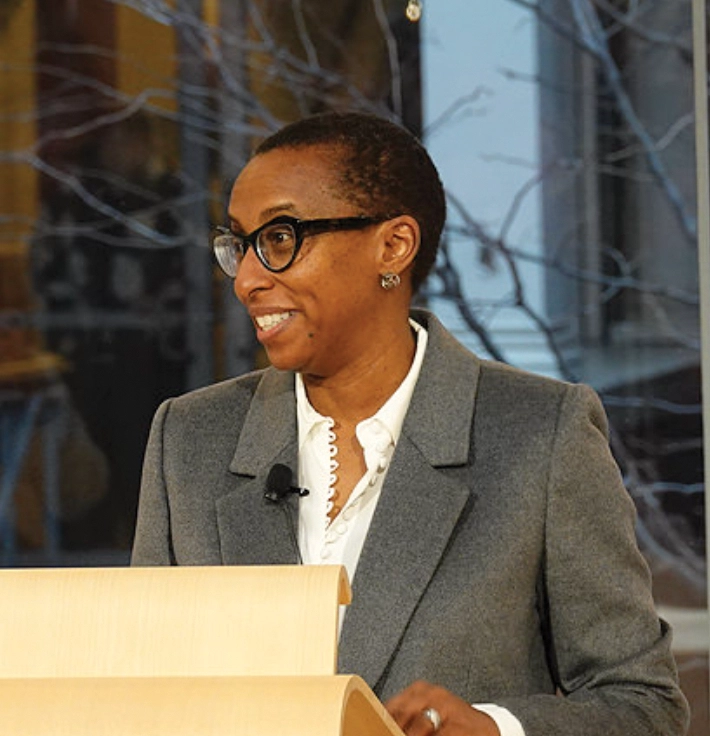Outdoor Dining on Bow Street
The block of lower Bow Street between Plympton and DeWolfe Streets could be closed to vehicle traffic, paving the way for outdoor dining at Daedalus, Sea Hag, and the Blue Bottle coffee shop. The Cambridge City Council is pursuing plans for closing a portion of Bow Street to car traffic in the spring of 2026, working with the Univer- sity and the Harvard Square Business Association. According to local news reports, city officials envision a European-style pedestrian pla- za—and note that the street was closed for construction for two years with no significant impact on surrounding traffic.
Harvard—and Its Faculty— Win in Federal Court
In two separate rulings in September, federal district judges called out the Trump administration for violating the First Amendment. District Judge Allison Burroughs restored more than $2.2 million in cancelled grants to Harvard after ruling that the administration’s freeze order—in response, federal officials said, to antisemitism and political imbalance on campus—violated Harvard’s free speech rights. While Burroughs acknowledged that Harvard “could (and should) have done a better job” of dealing with harassment, she accused the government of using antisemitism “as a smokescreen for a targeted, ideologically-motivated assault on this country’s premier universities.”
Weeks later, District Judge William Young issued a scathing 161-page ruling in a lawsuit brought by Harvard’s chapter of the American Association of University Professors, among other parties. The plaintiffs charged that, in its efforts to deport noncitizens engaged in pro-Palestinian speech, the Trump administration was chilling free expression and creating a climate of fear and repression. Young, calling the case “perhaps the most important ever to fall within the jurisdiction of this district court,” declared that First Amendment protections apply to noncitizens. He said he would determine what the consequences for the government should be for violating the Constitution.
Absent a Settlement, a Squeeze
In the absence of a settlement, the Trump administration continued to pressure Harvard over the summer and early fall. In September, citing “growing concerns” about the University’s financial stability, the government placed Harvard on heightened cash monitoring status, a designation that requires the University to use its own funds to pay out federal aid to students before requesting reimbursement from the U.S. Department of Education (DOE). The DOE also said it was requiring Harvard to provide a $36 million letter of credit, guaranteeing that it would fulfill its financial obligations to students and the government, and threatened to cut off all access to federal student aid over what it said was the University’s “continued refusal” to turn over admissions data.
Later in the month, the U.S. Department of Health and Human Services announced that it was referring the University for “debarment,” laying the path for the administration to block Harvard from receiving any future federal grants or contracts. The move was based on a charge, from the department’s Office for Civil Rights (OCR), that Harvard violated the Civil Rights Act of 1964 by “acting with deliberate indifference towards antisemitic student-on-student harassment” following the October 7, 2023, terrorist attacks in Israel.
The New York Times reported that earlier in September, Harvard had sent a caustic 163-page letter to the Trump administration, charging that the OCR’s determination was based on flimsy evidence and ignored actions Harvard has taken over the past two years to address campus antisemitism.
Trump Outlines Goals for Colleges
In early October, the Trump administration sent a group of nine universities a “Compact for Academic Excellence in Higher Education,” outlining a list of requirements that would grant them preference for federal funds. Harvard was not on the list of recipients. Still, the document, condemned by some as an assault on academic freedom, serves as a kind of blueprint for the administration’s goals and hints at some of the demands Harvard might face in settlement negotiations: requiring standardized test scores in admissions; maintaining institutional neutrality; requiring the preservation of same-sex spaces, such as women’s locker rooms; and limiting foreign students to 15 percent of the undergraduate population, with no more than 5 percent from a single country. The document also demands that a university with an endowment exceeding $2 million per undergraduate student—a description that fits Harvard—not charge tuition for admitted students pursuing hard science programs.
Orchestra Suspended for Hazing
A greater nationwide scrutiny on collegiate hazing fell swiftly on the Harvard-Radcliffe Orchestra, which was banned from operating as a club for the semester following a complaint about a retreat that, according to The Crimson, involved vodka, hand sanitizer, a blindfolded nighttime march, and a conga line.
Dean David Deming said the College has tightened its hazing enforcement in response to the Stop Campus Hazing Act, which passed Congress in 2024 and requires colleges that receive federal financial aid to report hazing incidents and develop hazing prevention programs and policies. “Our hazing policy at Harvard College has not changed,” says Deming. “What changed was the law, and we’re committed to following the law.”
A Satellite Goes Dark
A climate satellite built with contributions from Harvard researchers unexpectedly went dark in June, after a little more than a year in space. Launched with great fanfare and tech-giant funding in March 2024, MethaneSAT was designed to detect plumes of invisible methane emissions from space, and it was meant to collect data for five years.
In September, Harvard scientists who worked on the project told The Crimson that even during its brief lifespan, the satellite amassed a vast trove of “beautiful” data that will take a year to process and may pave the way to new discoveries—perhaps even a MethaneSAT 2, though it may not be based at Harvard.
Gay Critiques Donor Pressure, Harvard Response

During a September address to the Netherlands Institute for Advanced Study in Amsterdam, former Harvard president Claudine Gay criticized the University’s response to Trump administration attacks. “The posture of the institution seems to be one of compliance,” she said, in remarks that were reported by The Crimson and The New York Times. Gay also sharply condemned donors whose increasingly common public ultimatums, she said, “force institutions to choose between donor preferences and public integrity.” (Gay’s exit from Harvard’s presidency in 2024 was hastened by donor outcry.) Gay drew a distinction between supporting higher education and steering its direction, and she advised universities “to say no to gifts with inappropriate conditions and donors with inappropriate demands.”
Women and Gender Studies Professor Denied Tenure
Some faculty expressed surprise that Durba Mitra, the Wolf associate professor of women and gender studies, was denied tenure this summer. When she was hired as an assistant professor in 2017, Mitra, who studies sexuality in South Asian history, was the first full-time faculty member hired by the committee on degrees in studies of women, gender, and sexuality. (The department had previously relied on interdisciplinary joint appointments.)
In the 2022-23 academic year, Mitra was the acting faculty director of the Schlesinger Library on the History of Women in America. Last January, Campus News, a conservative website that highlights left-wing courses and activities on college campuses, wrote an article about her course, “The Sexual Life of Colonialism,” which focused on “the role of colonialism and neocolonialism in racial imaginations of gender and sexuality.” Mitra will have to leave the University within a year.









